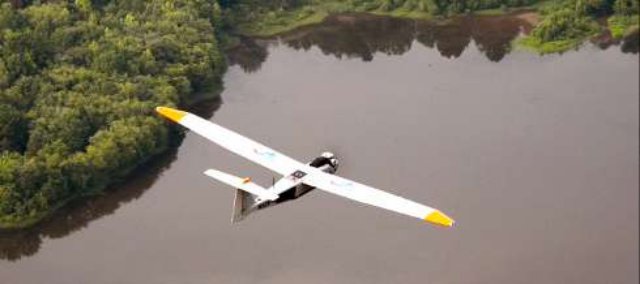Unmanned aircraft researchers associated with the Mid-Atlantic Aviation Partnership at Virginia Tech tested new sensor technology designed to detect potentially disruptive activities along energy pipeline routes.
The flights last week near Farmville, in rural Virginia, involved a fixed-wing RS-20 unmanned aircraft flying beyond the visual line of sight of ground observers. The aircraft had a wingspan of more than 17 feet and was equipped with optical and infrared sensors designed to detect threats to pipeline integrity. A piloted chase aircraft, with a visual observer onboard, followed behind the UAS to ensure safety.
As part of the research objectives, flight researchers were required to identify construction equipment and other potential hazards to the pipeline that had been placed along the test route. As is typical for a blind test, the flight operations team had no advance knowledge about the locations of the potential threats along the route.
“We established the safe and efficient unmanned aviation operations during previous flights and this time we began the transition to operational data collection and processing,” said David Yoel, chief executive officer of American Aerospace Technologies Inc., a Pennsylvania-based company that provided the test aircraft, sensors, and flight team.
Researchers flew over a Colonial Pipeline Company right-of-way. The effort is supported by the Pipeline Research Council International, a collaborative research organization within the energy pipeline industry.
Ultimately, the Federal Aviation Administration will decide whether unmanned aircraft operations for utility inspections have met safety standards for this type of operation.
“It’s exciting to see with each mission we are advancing toward an era where unmanned aircraft can safely share the airspace and be used to provide a valuable tool for this industry,” said Rose Mooney, executive director of the Mid-Atlantic Aviation Partnership, which is headquartered at the Institute for Critical Technology and Applied Science at Virginia Tech.
The test flights using unmanned aircraft, commonly known as drones, align with the Commonwealth of Virginia’s efforts to make Virginia a leader in the development and deployment of unmanned systems.
“Unmanned systems provide a key role in building the ‘New Virginia Economy‘ — the assets available in Virginia provide tremendous opportunities for industry leaders to work with the top experts in unmanned autonomous technologies,” Secretary of Technology Karen R. Jackson said.
In addition to being a step toward safer and more economical aerial inspections of energy pipelines, the research advances efforts to develop UAS technology for commercial and industrial uses.
The Commonwealth of Virginia has committed more than $2 million in Federal Action Contingency Trust (FACT) funds to Virginia Tech to operate an unmanned aircraft systems test program in the state.
The Federal Aviation Administration selected Virginia Tech in December, 2013, as one of six national test programs to conduct research to integrate unmanned aircraft into the nation’s airspace.
Photo: An aerial view of an unmanned aircraft during a research flight near Farmville, Virginia. The photo was taken from a chase plane that followed the aircraft for safety purposes. Credit: American Aerospace Technologies Inc
Source: ECN

